25+ Sample Interview Questions and Answers
-
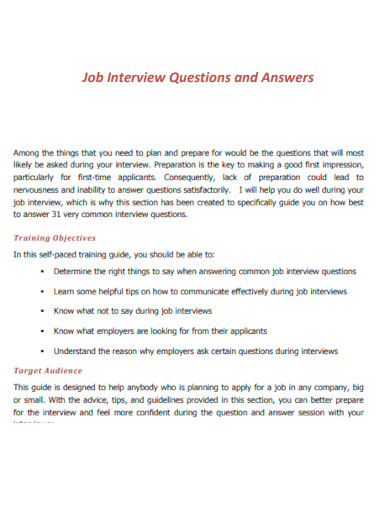
Job interview Questions and Answers
download now -
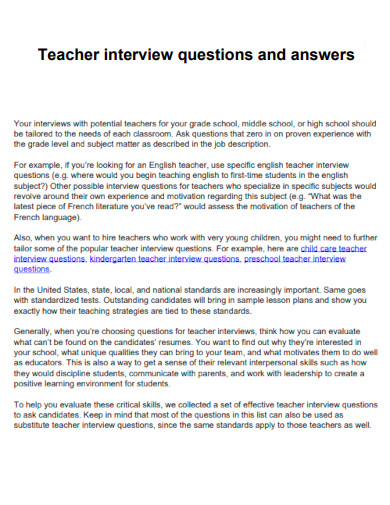
Teacher Interview Questions and Answers
download now -
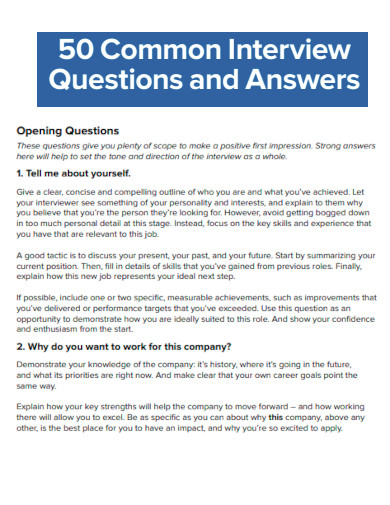
Common Interview Questions and Answers
download now -
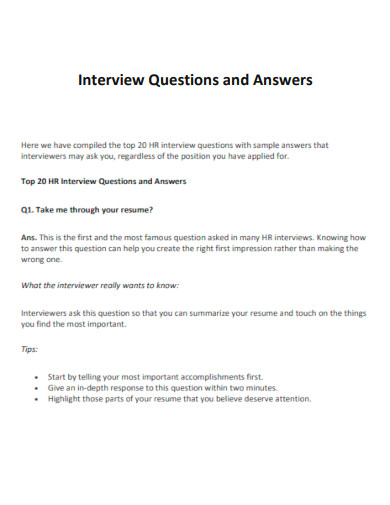
Basic Interview Questions and Answers
download now -
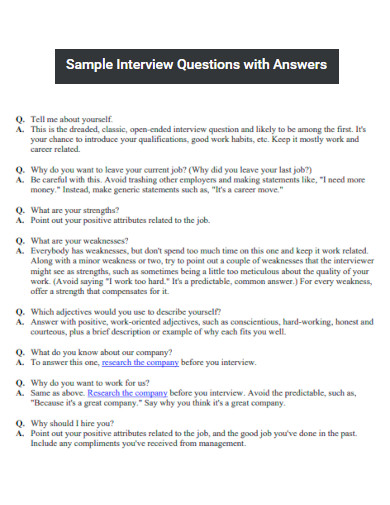
Sample Interview Questions with Answers
download now -
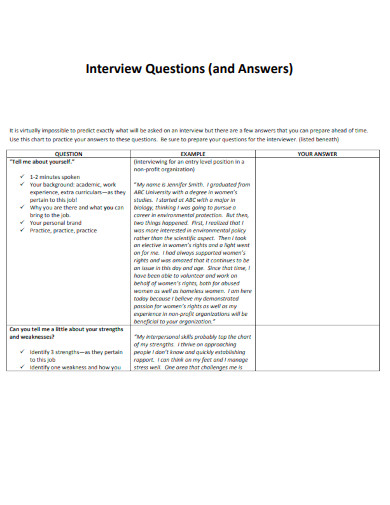
Written Interview Questions with Answers
download now -
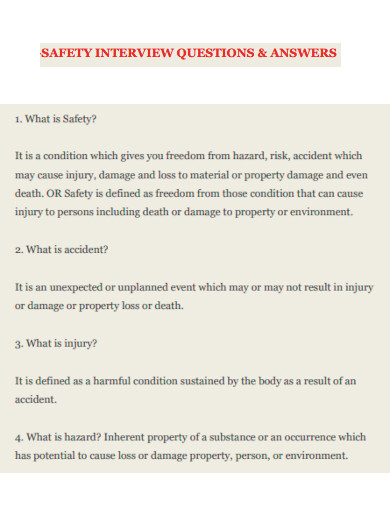
Safety Interview Questions and Answers
download now -
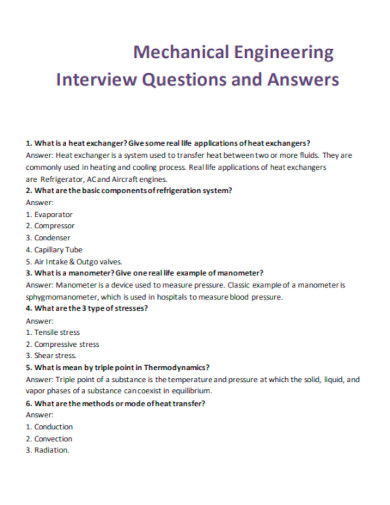
Mechanical Engineering Interview Questions and Answers
download now -
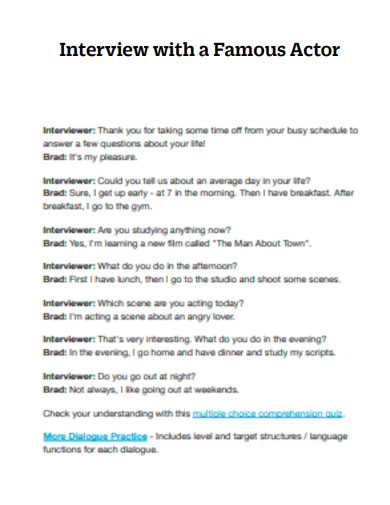
Actor Interview Questions and Answers
download now -
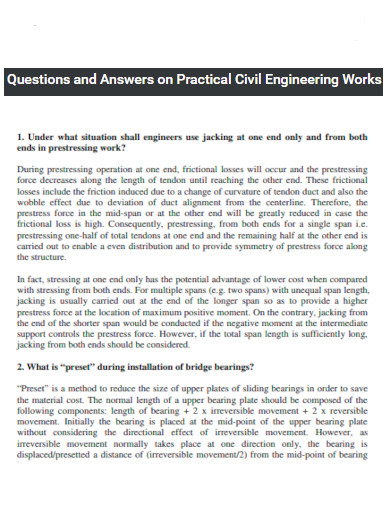
Questions and Answers on Practical Civil Engineering Works
download now -
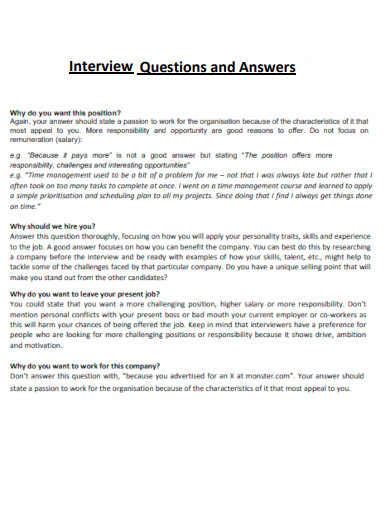
Short Interview Questions and Answers
download now -
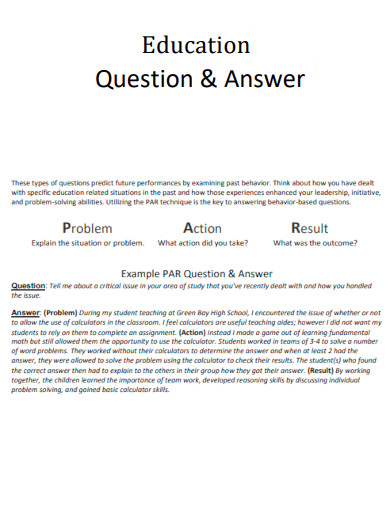
Education Interview Questions and Answers
download now -
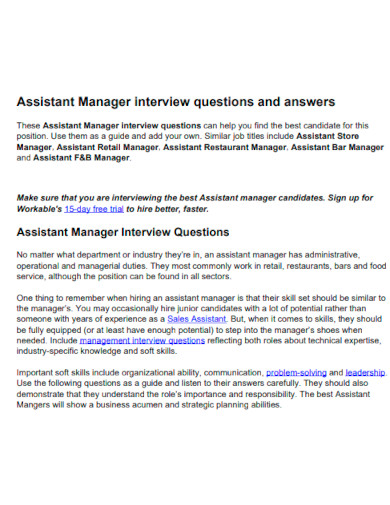
Assistant Manager Interview Questions and Answers
download now -
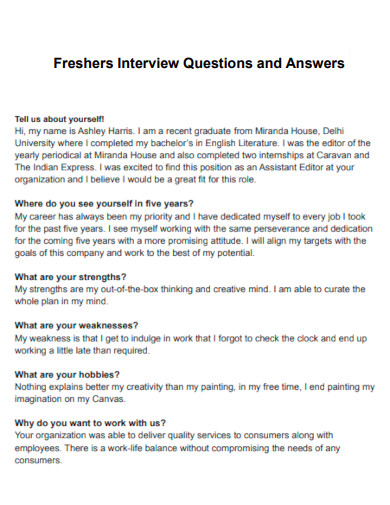
Freshers Interview Questions and Answers
download now -
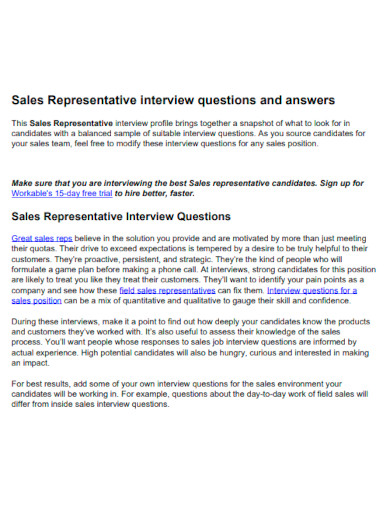
Sales Representative Interview Questions and Answers
download now -
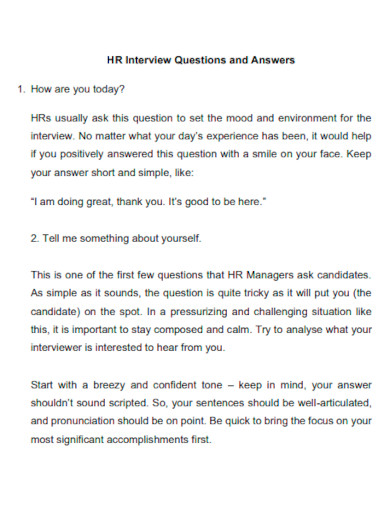
HR Interview Questions and Answers
download now -
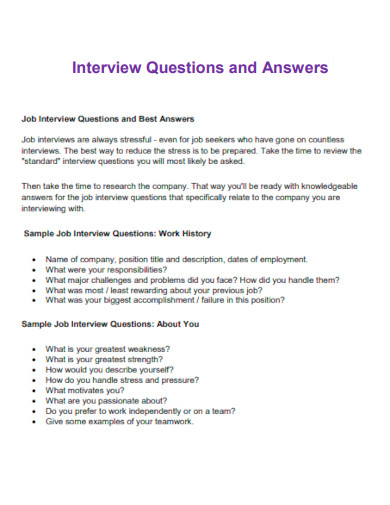
Interview Questions and Answers in PDF
download now -
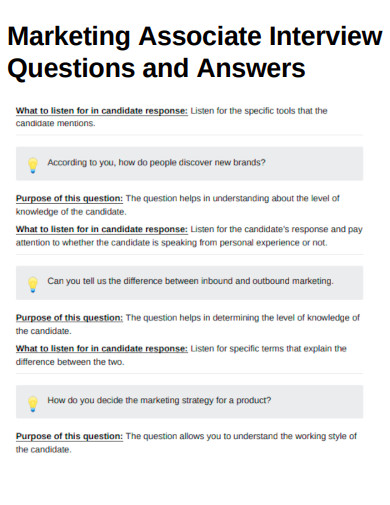
Marketing Associate Interview Questions and Answers
download now -
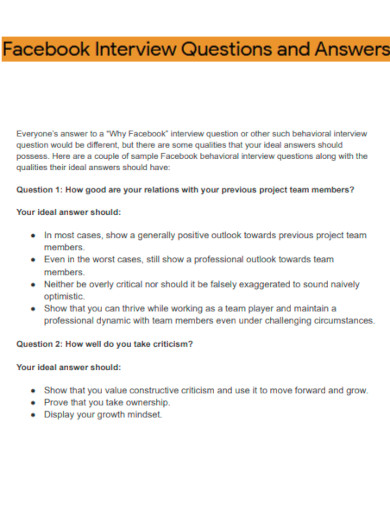
Facebook Interview Questions and Answers
download now -
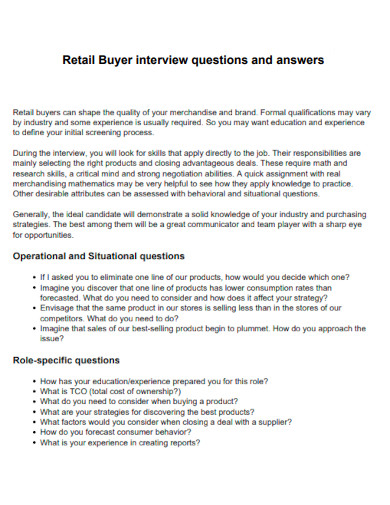
Retail Interview Questions with Answers
download now -
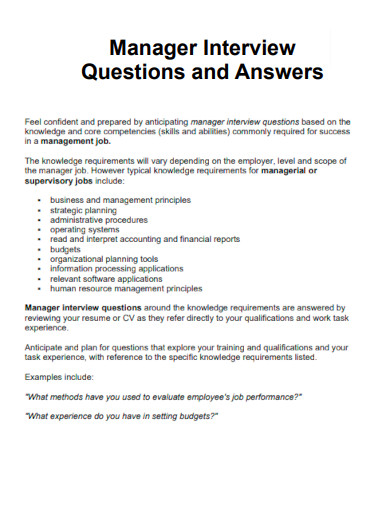
Manager Interview Questions and Answers
download now -
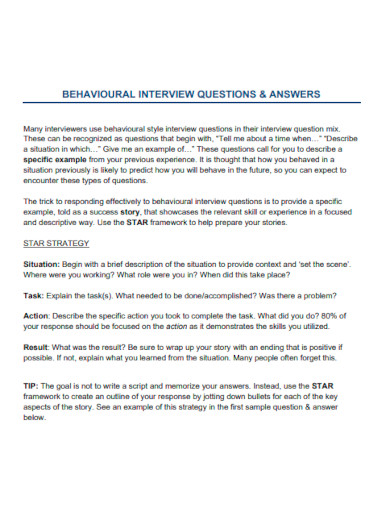
Behavioral Job Interview Questions and Answers
download now -
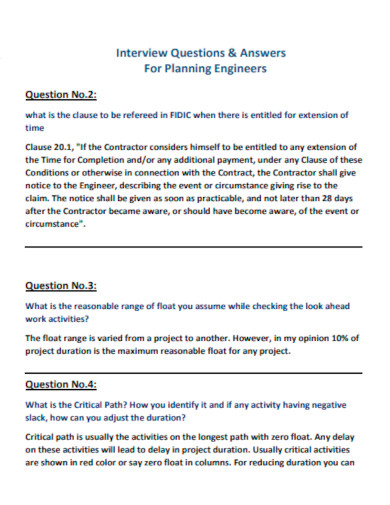
Interview Questions and Answers For Planning Engineers
download now -
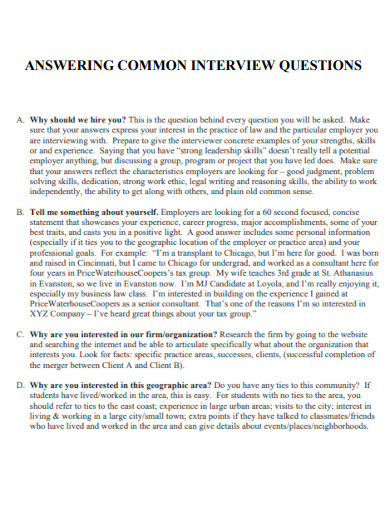
Most Common Interview Questions and Answers
download now -
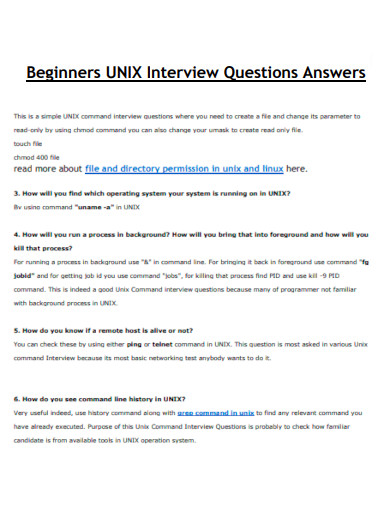
Beginners UNIX Interview Questions Answers
download now -
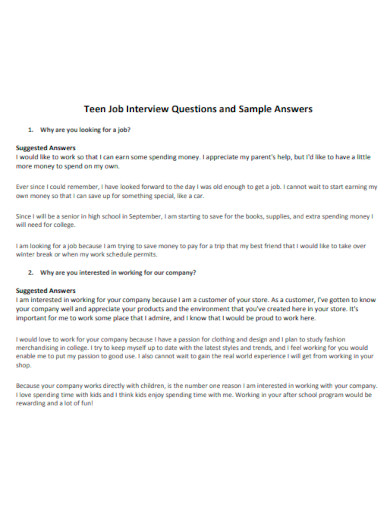
Teen Job Interview Questions Answers
download now
FREE Interview Questions and Answers s to Download
25+ Sample Interview Questions and Answers
What Is an Interview?
Benefits of an Interview
Types of Interviews
How to Answer Interview Questions Confidently
FAQs
How do you handle interview questions?
How do I introduce myself in an interview?
What do you consider your strength?
What Is an Interview?
A job interview is a discussion between a prospective employer and a candidate. It is a procedure designed to assist an employer in evaluating a candidate’s skills, personality, character, and domain knowledge. In this formal interview, the employer asks the candidate questions to obtain information. Interviews typically occur during the final phase of the recruitment process and help companies select the best candidate for a position. During an interview, the interrogator may inquire about your salary expectations, while you may inquire about the position’s duties. A second purpose of an interview is to verify the applicant’s resume. Employers use this opportunity to investigate a candidate’s claim and determine whether evidence can support it.
Benefits of an Interview
You can conduct a successful interview if you know the obstacles to watch out for during the interview after learning about the advantages. Below, we explore the benefits of interviews and their advantages. Here are a few of its advantages.
Types of Interviews
Employers may ask you to participate in an interview when seeking a career transition to assess your personality, skills, and work ethic. An employer or interrogator can determine whether you are a qualified candidate for a vacant position through an interview. Learning more about interviews and how to present yourself during an interview can increase your possibility of obtaining a desired position. If you are still inclined, the following are a few types of interviews you may encounter during the hiring process:
1. Structured Interviews
In a structured interview procedure, an employer asks all candidates appearing for an interview the same set of questions. Instead of concentrating on experience-based questions, an employer prefers to ask a standard set of questions and record each candidate’s responses. Using a suitable scoring system, they evaluate these responses and employ candidates based on the result. A structured interview is advantageous for both interviewers and candidates because it removes prejudice from the selection process.
2. Unstructured Interviews
Conversations in unstructured interviews are conversational and spontaneous. The interviewer may inquire about the candidate’s talents, experience, or qualifications. Such interviews do not follow a predetermined structure and can take any direction. Organizations use this traditional interviewing method to hire qualified candidates. Using an unstructured interview, interviewers evaluate a candidate’s interviewing abilities by comparing their performance review with that of other candidates.
3. Situational Interviews
In a situational interview, employers pose a problem to a candidate. The purpose of the interview is to evaluate the candidate’s approach to problem-solving. An employer can determine how a candidate would respond in work-related situations through interviews. When responding to such inquiries, employers anticipate candidates to provide examples of how they have handled similar cases.
4. Behavioural Interviews
Employers use behavioural interviews to assess and evaluate a candidate’s past behaviour in various situations. It aids in determining how a candidate would behave in comparable work situations. It is more specific for an employer to predict a candidate’s future success based on past performance. Typically, an employer will ask open-ended queries about particular situations to hire a qualified candidate. The employer then compares the candidate’s response to a predetermined rating scale.
5. Stress Interviews
Employers use this interview technique to evaluate a candidate’s ability to respond to stress in various workplace situations. Employers conduct stress interviews for certain positions, such as consulting, to identify stress-sensitive applicants and distinguish them from those with a high-stress tolerance. It is a compelling interview technique for identifying applicants who may lose their composure under pressure. In such job interviews, employers generate anxiety in gauging a candidate’s response.
6. Technical Interviews
A technical interview is a form of interview that enables employers to assess technical and job-related aptitude. Candidates applying for healthcare, information technology, engineering, and science positions are more likely to endure technical interviews. Through such interviews, an employer evaluates your technical knowledge and determines whether you possess the skills necessary to perform your job-specific duties.
7. One-To-One Interviews
A technical interview is a form of interview that enables employers to assess technical and job-related aptitude. Candidates applying for healthcare, information technology, engineering, and science positions are more likely to endure technical interviews. Through such interviews, an employer evaluates your technical knowledge and determines whether you possess the skills necessary to perform your job-specific duties.
How to Answer Interview Questions Confidently
Employers prefer candidates who exhibit confidence during a job interview. They will presume that you will perform better if you exude confidence. But how can you ensure that you appear and sound confident during interviews? It’s one thing to feel confident during an interview, but it’s crucial that employers can see this confidence. How can you feign enthusiasm if you are unsure of yourself or one of the employer’s interview questions? In the following section, I will discuss the best methods to demonstrate confidence in an interview so you can be hired more quickly.
1. Maintain Eye Contact When Responding to Queries
Establishing and maintaining eye contact is one of the most crucial skills to acquire to convey confidence in any interaction. Maintain eye contact when listening and speaking. When displaying confidence, nothing is more important than making eye contact; conversing with the interviewer while staring downward or to the side is highly noticeable.
2. Maintain Solid Body Alignment
Once you have developed the habit of sustaining eye contact, you should consider your body positions. You should stand and sit with your arms at your sides, not crossed. Instead of shrinking yourself, make your body occupy much space. This is how one can appear confident. Also, maintain stillness and make controlled, calculated movements. Do not continuously hold a pen or piece of paper and fidget. Avoid tapping your palms or feet as well. It is acceptable to speak animatedly and with your gestures. In the majority of interviews, enthusiasm is a plus. But refrain from moving your hands when you should be attentive!
3. Deliver Your Answers Methodically and With Composure
Next, you must confidently respond to interview inquiries, which includes not blurting out answers, speaking slowly, and not rushing. When addressing the interviewer, you will sound more assured if you maintain a slow, relaxed response cadence. It is also prudent to take one or two seconds to reflect after each interviewer’s query. Just pause for a moment to confirm that you comprehend the question and to consider the optimal response. Once a reply is given in an interview, it is irretrievable.
4. Develop Your Tone of Voice
When answering the interviewer’s inquiries or rehearsing at home, observe whether your voice rises at the end of each response, as if you were asking an interview question. This may give the impression that you need more conviction in your answers. Instead, your answers should sound like assertive sample statements, not queries. Consider a scenario where a friend asks you what time it is, and you glance at your phone to determine the precise time. Provide a voluntary response sample aloud and observe your tone of voice at the close of the sentence.
FAQs
How do you handle interview questions?
Your interviewers will likely begin by asking about yourself and your background to learn more about you. First, provide an overview of your current position or activities, followed by the most significant and pertinent highlights from your experience that make you the most qualified candidate.
How do I introduce myself in an interview?
To introduce yourself professionally in an interview, begin with a polite greeting, state your full name, describe your educational background and work experience, emphasize your skills development plan and strengths, briefly describe your career plans, and express gratitude for the opportunity.
What do you consider your strength?
To evaluate your strengths, consider the skills you possess and can demonstrate through specific examples and accomplishments. Then, choose the strengths that have aided you the most in your career or will be helpful for the position you seek now.
You will receive more job offers if you utilize the procedures above to appear confident. Employers appreciate self-assured responses to their interview queries. They understand natural eye contact and have a composed demeanour. However, recruiting managers also want to see that you have a human side during the interview process. Utilize the guidelines above to demonstrate to potential employers that you can endure the challenges of their position but be aware of the disadvantages of faking confidence in an interview.
